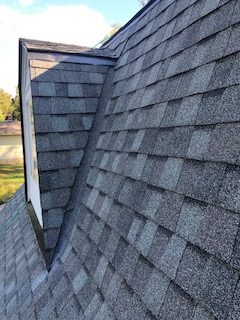Welcome to Horizon Roofing & Construction, your trusted partner in creating durable and aesthetically pleasing roofs. Choosing the right roofing tiles is crucial for both the longevity and visual appeal of your home. In this blog, we will delve into the three most common roofing tiles: asphalt shingles, clay tiles, and metal roofing tiles. Understanding their characteristics will help you make an informed decision for your roofing needs.
Asphalt Shingles
Popularity and Usage: Asphalt shingles are the most popular roofing choice in the United States, covering nearly 80% of residential roofs. Their widespread use can be attributed to their affordability, ease of installation, and versatility in various climates.
Types of Asphalt Shingles:
- 3-Tab Shingles: These are the most basic and economical option. They have a flat appearance and are lightweight, making them easy to install.
- Architectural Shingles: Also known as dimensional or laminate shingles, these offer a more textured and three-dimensional look. They are thicker and more durable than 3-tab shingles.
- Luxury Shingles: These high-end shingles mimic the appearance of natural slate or cedar shakes. They offer superior durability and aesthetics but at a higher cost.
Pros:
- Cost-Effectiveness: Asphalt shingles are budget-friendly, making them an attractive option for many homeowners.
- Ease of Installation: They are relatively easy to install, which can reduce labor costs.
- Variety of Colors and Styles: Available in a wide range of colors and designs, they can complement any home style.
Cons:
- Shorter Lifespan: Typically, asphalt shingles last 20-30 years, which is shorter than some other roofing materials.
- Susceptibility to Wind Damage: High winds can lift and damage shingles, leading to potential leaks.
Clay Tiles
Aesthetic Appeal: Clay tiles provide a traditional and classic look, often associated with Mediterranean, Spanish, and Southwestern-style homes. Their distinctive appearance can significantly enhance a home’s curb appeal.
Durability: Clay tiles are known for their longevity, often lasting 50 years or more with proper maintenance. They are resistant to fire, rot, and insect damage, making them a reliable choice for many homeowners.
Pros:
- Eco-Friendly: Made from natural materials, clay tiles are environmentally friendly.
- Excellent Insulation Properties: They help keep homes cool in the summer and warm in the winter, contributing to energy efficiency.
- Adds Value to the Home: The aesthetic and durability benefits can increase the overall value of your property.
Cons:
- Higher Cost: Clay tiles are more expensive than asphalt shingles, both in terms of material and installation costs.
- Heavier Weight: The added weight of clay tiles requires additional structural support, which can increase installation complexity and costs.
Metal Roofing Tiles
Modern and Versatile: Metal roofing tiles are gaining popularity in modern and contemporary homes due to their sleek appearance and versatility. They can be crafted to mimic other materials, such as wood, slate, or clay.
Material Options:
- Steel: Durable and cost-effective, steel is often coated with a protective layer to prevent rust.
- Aluminum: Lightweight and resistant to corrosion, aluminum is ideal for coastal areas.
- Copper: Known for its longevity and distinctive appearance, copper develops a natural patina over time.
Pros:
- Durability: Metal roofs can last 40-70 years, making them a long-term investment.
- Energy Efficiency: They reflect solar radiant heat, which can reduce cooling costs.
- Low Maintenance: Metal roofs require minimal maintenance and are resistant to cracking, shrinking, and erosion.
- Recyclability: At the end of their lifespan, metal roofs can be fully recycled.
Cons:
- Higher Upfront Cost: Metal roofing tiles are more expensive initially than asphalt shingles.
- Noise Issues: During rain or hailstorms, metal roofs can be noisier than other materials. However, proper insulation can mitigate this issue.
Comparison of the Three Types
Cost Comparison:
- Asphalt Shingles: Most affordable upfront, with prices ranging from $100 to $200 per square (100 square feet).
- Clay Tiles: Mid to high range, costing between $300 to $600 per square.
- Metal Roofing Tiles: Higher initial investment, with costs between $200 to $900 per square, depending on the metal type.
Durability and Lifespan:
- Asphalt Shingles: 20-30 years.
- Clay Tiles: 50+ years.
- Metal Roofing Tiles: 40-70 years.
Maintenance Requirements:
- Asphalt Shingles: Regular inspections and occasional repairs for wind damage.
- Clay Tiles: Minimal maintenance, primarily to check for cracked or broken tiles.
- Metal Roofing Tiles: Low maintenance, periodic inspections for dents or loose fasteners.
Choosing the Right Tile for Your Home
Climate Considerations: In Michigan, where Horizon Roofing & Construction operates, the weather can be quite variable. Metal roofing tiles are excellent for their durability in snow and ice, while asphalt shingles can be a cost-effective option for moderate climates. Clay tiles are less common in cold climates due to their weight and potential for freeze-thaw damage.
Aesthetic Preferences: Consider the architectural style of your home. Asphalt shingles offer versatility, clay tiles provide a timeless look, and metal roofing tiles cater to modern aesthetics.
Budget: Balancing upfront costs with long-term benefits is crucial. While asphalt shingles are affordable initially, clay and metal tiles offer superior durability and may save money in the long run through reduced maintenance and longer lifespans.
Conclusion
In summary, asphalt shingles, clay tiles, and metal roofing tiles each offer unique benefits and drawbacks. Asphalt shingles are cost-effective and versatile, clay tiles provide a classic aesthetic and longevity, and metal roofing tiles offer modern appeal and durability. For professional advice and installation tailored to your specific needs, contact Horizon Roofing & Construction. Schedule a consultation or request a quote today to ensure your roof stands the test of time.

